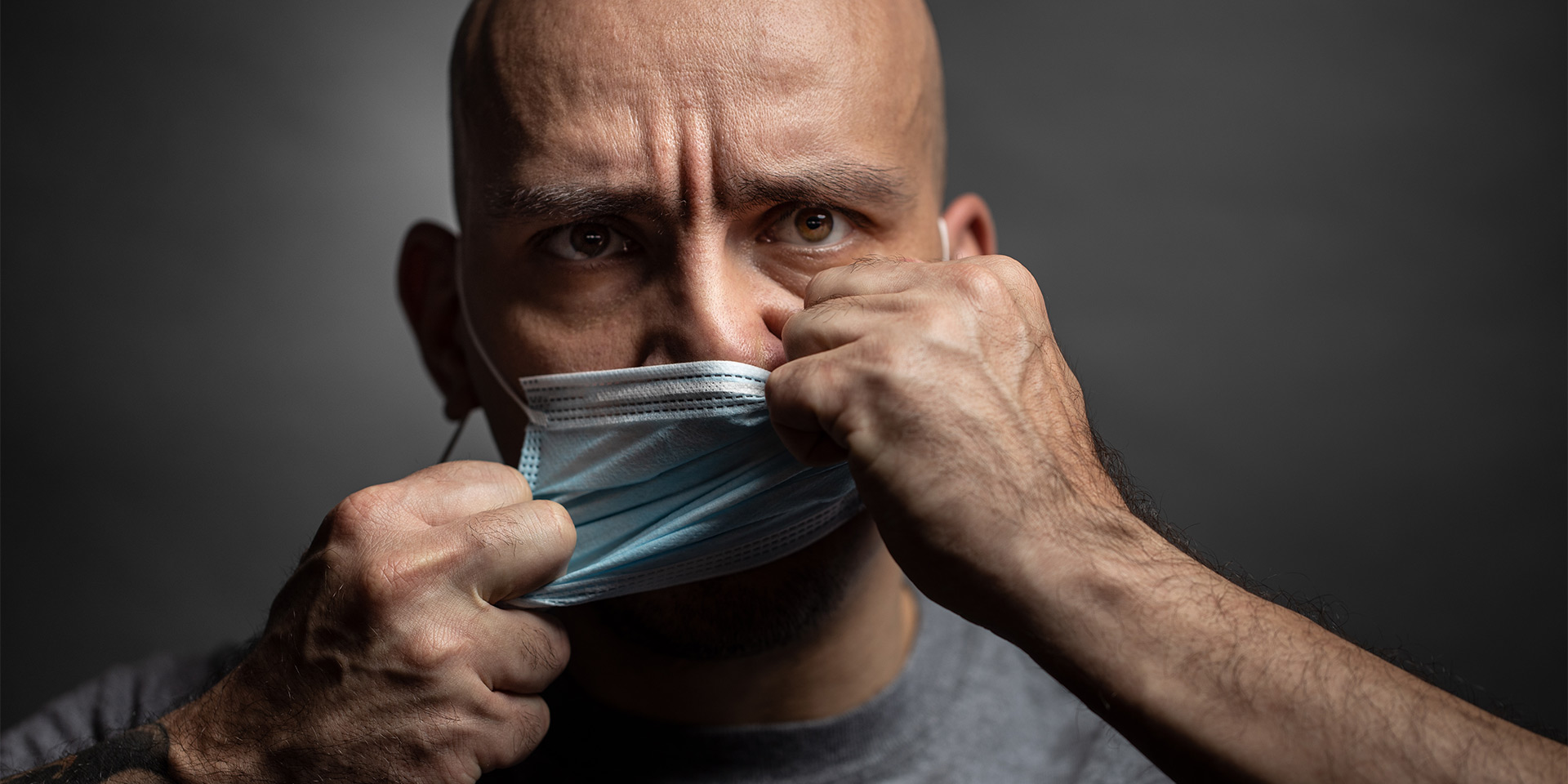“I live in a high and holy place, but also with the one who is contrite and lowly in spirit, to revive the spirit of the lowly and to revive the heart of the contrite” (Isaiah 57:15).
Years ago, trying to encourage a person I admired and seeing her discouraged by her recent life experiences, I felt stunned by what she said to me: “I think God has more important things to do than take care of me.” What can one answer to this? Why is the attitude of refusing to let yourself be helped or ask for help wrong?
States that require calming down
It’s natural to want our default state to be calm, for that inner pulse, which varies from apathy to excitement, to have an average, balanced “value.” But, when we lose our calm in a situation perceived as a crisis, we end up experiencing either panic, worry, fear, anger, or restlessness.
How does prayer help us overcome these emotions and return to being calm—or even experience calmness, perhaps, for the first time? How does one experience, through the conscious tuning of our reactions, that serenity that the ancients, the religious, talked about, and that is almost no longer talked about today?
Serenity is a state of grace for those who can detach themselves from flawed circumstances and achieve a serene (not apathetic) calm—a superior, uplifting silence, a feeling of floating above life’s “ceiling of clouds.”
The calming prayer: moving from panic to calm
For someone sceptical about the usefulness of prayer, I will recount a real-life situation from the time of the former communist regime: it was a winter evening, with snow and ice on the streets of Bucharest and, as had happened so many times before, the electricity had been cut off, due to the economic crisis that the Romanians were going through.
Pharmacist X, a young atheist intellectual, thinking that it is useless to remain in the dark in the pharmacy, locks up but, as he is about to leave, a child enters and asks him to come back and urgently give him what the doctor has prescribed for his sick mother. The pharmacist unlocks the pharmacy, fumbles his way to the shelves he knows very well and sells the boy what is written on the prescription.
On the way home, he realises that, recently, the order of some products on the shelves had been changed and that where he would have usually found the medicine on the prescription now was a lethal poison. He comes back, checks and, panicked, realises the catastrophe and the inability to do anything to remedy the situation.
Then, for the first time in his life, he falls to his knees and addresses God: “If you exist, help me not to become a murderer! I don’t want to become a murderer!” A few moments later, the child came back crying, because he had slipped on the ice and the bottle had broken. From then on, the pharmacist was no longer an atheist.
Panic is characterised either by perplexed, desperate helplessness, or by the loss of the ability to think clearly, to control our emotions, as well as by the loss of control over one’s own actions. We are not referring here to the medical aspects subsumed under the diagnosis of “panic attack”, but to the common emotion, experienced by people without dysfunctional mental activity.
This does not mean that we cannot also tackle the panic attack with fervent prayer, in which we shift the centre of gravity from ourselves to the person of God. The panic produced as a blockage of the decision-making process, of the search for a solution, can be very damaging, especially because it occurs against the background of a time and internal resources crisis, a pressure that seems unbearable and without a way out.
In such moments, it is good to remember that impulses are not a good adviser and that it is wiser to postpone our first reactions dictated by somatisations, stress hormones, or variations in blood pressure, pulse and breathing, because, due to the blockage of reason, we risk harming ourselves and resorting to flawed behaviours, with regrettable consequences.
My great-grandmother’s advice—drink a glass of water before you speak or do anything else—works, because it gives you time to think things over and reminds you that you are not alone and helpless. This helps you realise that when you feel under an assault of evil, you can take control if you let that panic climax, where you are pressured to say or do something, pass.
This short respite is enough for you to, internally and confidentially, say a fervent prayer in your mind: “Lord, have mercy on me. I am your child. Give me one more chance, in Your goodness!” Other details are not necessary to Him who assures us that not even a sparrow perishes without His knowledge (Matthew 10:29).
The power of prayer in the midst of panic comes from trusting that we are never alone, forgotten, isolated, or unimportant in His eyes and that He takes our burden when we no longer find the strength to carry it, because He has been declaring to us for millennia: “I have loved you with an everlasting love; I have drawn you with unfailing kindness” (Jeremiah 31:3). When comparing them to human millennia and His eternity, how much do those few moments of panic actually weigh in the end?
The calming prayer: moving from worry to calm
Let me tell you another true story. In a train station in Italy, late in the evening, a Romanian lady, a university professor who has just successfully participated in an international congress, tired and hungry, realises that she has missed both the train and the return plane home.
She only has a little money left and she doesn’t know if it is enough to look for a hotel, take a taxi, and spend the night there until the next day, when she would have another travel opportunity. Very worried, but not defeated, she exclaims: “Lord, I can’t seem to find any solution to all of this. I leave this in Your hands!”
Through this strength of trust in Providence, the calming effect came immediately, along with the solution. She saw the police office in front of her and, in elegant Italian, she shared her situation and her concern about not finding a decent, affordable hotel in the vicinity with the police officers. They offered to help her, choosing a suitable hotel for her and driving her there in a police car.
Worry is a state of uneasiness and pressure, variable in duration and with an identifiable reason: a particular problem causes worry and doubt that we can overcome it. Nevertheless, the echo of the Saviour’s words pierces through the millennia in solidarity and empathy: “Each day has enough trouble of its own” (Matthew 6:34).
And if, for our daily concerns, we are urged to trust in Him, how much more so when He exhorts us: “Do not let your hearts be troubled. You believe in God; believe also in me. My Father’s house has many rooms; if that were not so, would I have told you that I am going there to prepare a place for you?” (John 14:1-2).
The calming prayer: moving from fear to calm
Let me recount a memory from my childhood, when I was less than seven years old. I was at my grandmother’s house, and was walking a two-kilometre-long road, for the first time alone, from a valley to the house in the village, to feed some chickens. The road passed through a stream where some village children were playing. They perceived me as an intruder from the city into their universe, so they threw stones at my feet until I managed to cross the water.
On the way back, I was terrified by the thought that I would find them there, in the only place through which I knew I could pass to the valley where my grandmother was waiting for me. I turned my thoughts to God. I don’t even remember what I said, but I did it with that force that fear gives you, because I couldn’t see any way out. When I got to the stream, to my great surprise, the children didn’t seem to notice me. It was as if they were looking right through me.
I crossed the stream without any problems and then realised, for the first time, that I am not alone, not even when I feel alone, and that I can be brave even when I feel afraid. Where does the power come from? From the One who greets the fearful and reluctant Gideon calling him “mighty warrior” (Judges 6:12) and from the One who tells us, like a brother and a role model: “In this world you will have trouble. But take heart! I have overcome the world” (John 16:33). Compared to the scale of the victory of the whole world, how much do some bruises on the ankles matter?
The calming prayer: moving from anger to calm
Anger is an intense, explosive irritation, which can take several forms: it either resembles what the Latins called ira furor, the madman’s rage, often without justification; or it is an outburst of protest from someone who feels hurt or offended.
Anger is either the ascending process of uncontrolled annoyance and the violent dispositions of a volcanic temperament; or a justified revolt against an outrageous injustice. What we must do to get out of the state of anger is to cry out to God to protect us from temptation and sin, since the revealed text tells us: “In your anger do not sin” (Ephesians 4:26).
With the exception of this sinless, “holy anger”—which the Saviour also showed at the sight of the depravity at the temple—the other forms are related to human flaws and weaknesses. Every time we are tempted by such “human, all too human” (Nietzsche) anger, we should take a few seconds to ask God: “Help me, Lord, lest I become a bad person!” A king prayed, “See if there is any offensive way in me, and lead me in the way everlasting” (Psalm 139:24).
After this awareness of the danger, we immediately understand that we are not ourselves in those moments. However, we also understand how much it lies within our own power to put an end to the demonstration of anger. It requires a detachment from one’s own person and from the many interactions that led to the scandal in question, a view from a distance, as a painter moves away from a painting to get perspective on what needs to be touched up—and then, actually doing the retouching!
The calming prayer: moving from unease to calm
Unease is a special type of worry, diffuse, sometimes metaphysical, for abstract reasons of the conscience. It can persist as a background noise, which does not let us live without looking for a remedy. The remedy is moral; it is only this that can calm the conscience.
There are people who can feel whether they have acted according to the divine will or not, in that their choices are accompanied by either inner peace or restlessness. When our conscience is “laden” with wrong, sinful inclinations or decisions, an alarming emptiness appears, which whispers to us: “There is no peace for the wicked” (Isaiah 48:22). At the opposite pole, when you know that you have chosen according to His will, no matter how hostile the circumstances are, you remain calm.
For the recovery of the state of peace, it is enough, if we are honest with ourselves, to recognise in our conscience what the mistake is and to have the strength to correct it and turn away from it, saying: “Lord, in the name of Your Son Jesus Christ, who through His sacrifice lifted up the sin of the world and my sin, please forgive me and let Your will be done in my life!”
He who never changes assures us: “As surely as I live…I take no pleasure in the death of the wicked, but rather that they turn from their ways and live” (Ezekiel 33:11). There is a serenity, a peace, a tonic and superior calm, which can only be experienced through a life lived in harmony with the divine will.
Corina Matei is a PhD associate professor at the Faculty of Communication Sciences and International Relations, part of the “Titu Maiorescu” University, Bucharest.




















